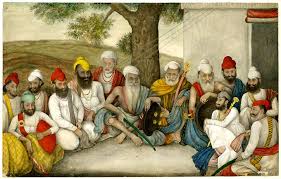Bhakti Movement originated in India in the 7th century. It was a spiritual and cultural revolution that transformed the country’s religious landscape. It emphasized the personal devotion and love of a devotee towards a deity, which was believed to be the key to achieving spiritual liberation and union with the divine.

Bhakti, which means “devotion” or “love,” was considered a more accessible path to salvation compared to the more scholarly and ritualistic approaches of Hinduism at the time. The Bhakti Movement also rejected the caste system and encouraged people from all walks of life to participate in devotional practices and seek a personal connection with the divine.
The Movement was characterized by the emergence of new devotional literatures, such as the Bhagavad Gita and the Ramcharitmanas, which helped spread its teachings across the country. It was also marked by the growth of devotional communities, known as “bhakti saints,” who sang hymns and composed devotional poetry to express their devotion to the deity. These saints, who were seen as messengers of divine love, transcended traditional social and religious boundaries and attracted large following from across India.
They criticized the caste system encouraged the women to join the movement. The saints of Bhakti movement were from lower caste. The bhakti movement challenged the dominance of Brahmins in the Indian society. The true devotee of the Bhakti movement does not have the desire to get Moksha, He just surrender himself in the worship of God.
Kabir
One of the most notable Bhakti saints was the 13th-century poet and mystic, Kabir, who advocated for a universal and inclusive form of devotion that rejected caste, class, and religious differences.
Mirabai
Another was the 15th-century saint and poet, Mirabai, who is celebrated for her devotion to Lord Krishna and her challenge to societal norms of her time.
The Bhakti Movement also had a profound impact on the development of devotional traditions in Hinduism, Sikhism, and Islam, and it continues to shape the spiritual landscape of India and the world to this day.
In conclusion, the Bhakti Movement was a major religious and cultural revolution in India, which emphasized the power of personal devotion and love as a path to spiritual liberation. Through its teachings, the movement inspired a new generation of saints and devotees who spread its message of love and devotion across the country, transforming the spiritual and cultural fabric of India forever.
Important Links